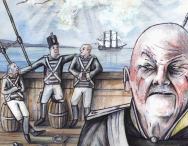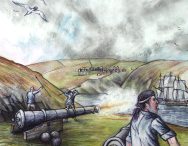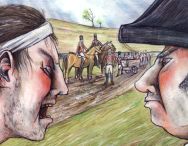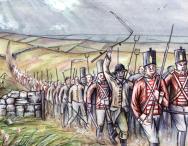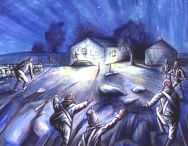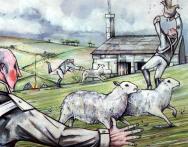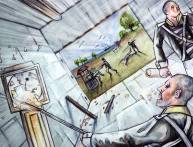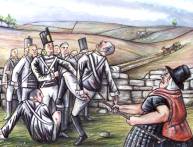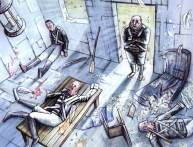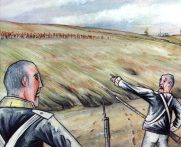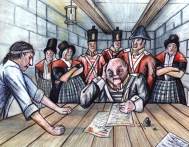One
mild Wednesday in February 1797 the last invasion of Britain began.
Round the corner from St David's Head four ships (flying English colours)
hove into the rocky bay of Fishguard.
Yet
although the 1400 soldiers were dressed in British uniforms these were dyed
a mottled black. In fact, half the men had joined the voyage straight from
prisons in France, and several of them still wore wrist- and ankle-irons.
Even the regular grenadiers seemed the worst that the nation could supply.
The
men spoke only French and called themselves La Legion Noire (the Black Legion).
Three Irishmen among the officers were interpreters between them and their
elderly commander, who spoke only a kind of English - he was an Irish-American
named Colonel Tate.
The
plans of the generals back in France had been simple: they thought many
countryfolk in the British Isles would sympathise with the recent French
Revolution and would join the invading army in marching against their own
government.
It
was a surprise, therefore, when from a fort on the harbour members of the
Welsh homeguard, under Lieutenant Colonel Knox, defended the Island of Britain.
The
Fishguard Fencibles scared off the enemy with blank shot from their eight
cannon since they daren't waste their ammunition - all 3 rounds of it.
On
Thursday morning Knox received orders to retreat inland to Haverford West.
Along the way he bumped into Baron Cawdor, who was advancing on the coast
with more volunteers, pulling two guns in farm-carts.
Briefly,
the invasion was forgotten. Cawdor and Knox argued over who should be in
command. Eventually, Lord Cawdor took charge, and their combined units hurried
on to Fishguard.
By
this time, the wealthier classes were fleeing the other way. But Lord Cawdor
exhorted them to join him, and many did, together with the local peasantry.
The
army was now well-equipped and would terrify any invader: as well as cannon,
pistols and sabres they carried mattocks and spades, pitchforks, billhooks
and straightened scythes.
Meanwhile,
the Frenchmen had landed nearby at Carregwastad Point. By moonlight they
had scaled the high cliffs and seized Trehowel Farm as Colonel Tate's headquarters.
Out at sea their frigates left for France.
The
invaders had been well supplied with weapons, gunpowder and hand grenades
but they'd brought no horses and little food or drink. During Thursday they
raided the nearest farms, chasing after sheep and poultry and cooking them
over camp-fires.
In
addition, they found home-brewed beer and plenty of port-wine: this had
been salvaged by the locals from a Portuguese trader recently wrecked off-shore.
Soon the whole Black Legion, except for the Colonel, were merrily drunk.
One befuddled grenadier thought he heard the clicking of a musket - and
had enough fighting spirit inside him to kill the ticking grandfather clock.
The
Welsh, of course, fought back: one Frenchman was tipped down a well; another
stunned with a chair-leg.
Lead
from the roof of St David's Cathedral (with permission from the Dean) was
stripped for bullets. These were given to the countryfolk (men and women)
who set off to the aid of Fishguard.
One
heroine was Jemima Nicholas, a cobbler by trade and especially brawny. Jemima
discovered 12 Frenchmen in a field. Wielding a pitchfork, she rounded them
up on her own and marched her prisoners to the local jail.
By
Thursday evening Colonel Tate had had enough of his rabble army. The men
were either asleep, drunk or mutinous. His headquarters were a mess: no
food remained; window frames had been smashed up for firewood; and mattresses
cut up for clothing, their feathers drifting around the farmhouse.
What's
more, his officers reported red-coated soldiers slipping through the countryside.
Clearly, the Black Legion was outnumbered. It was time to surrender.
On
Friday morning Tate assembled his men on Goodwick Sands to give up their
weapons. Still hungry and hung-over, the French troops marched down to the
beach to the beat of their drums.
Lord
Cawdor surrounded them on the hills above. By this time the ranks had been
swelled by hordes of Welshwomen. To those penned on the beach below, their
red flannel shawls and tall black hats resembled British uniforms.
Colonel
Tate realised his mistake: the extra soldiers seen by his officers had been
the women in traditional dress, and the opposing army wasn't so big after
all.
But
it was too late now: on Friday afternoon he signed a note of surrender.
Two days after it began, the last invasion of Britain was over.
*
THE END *

